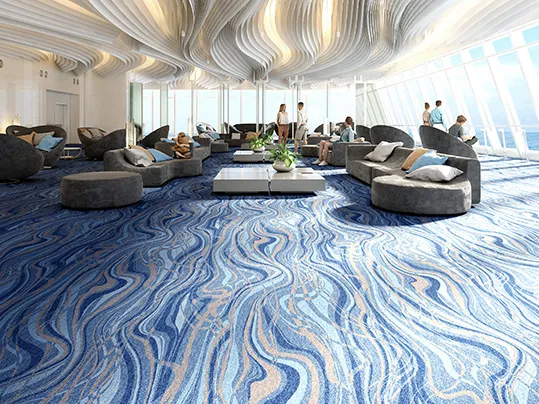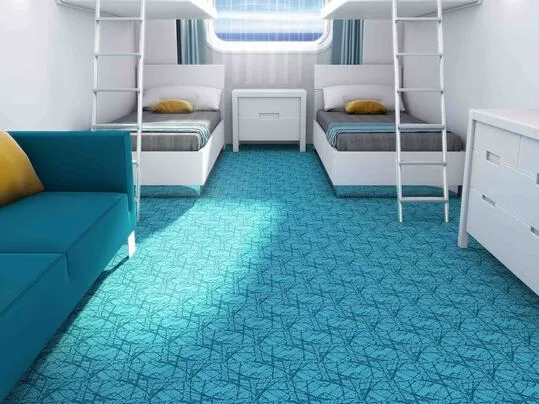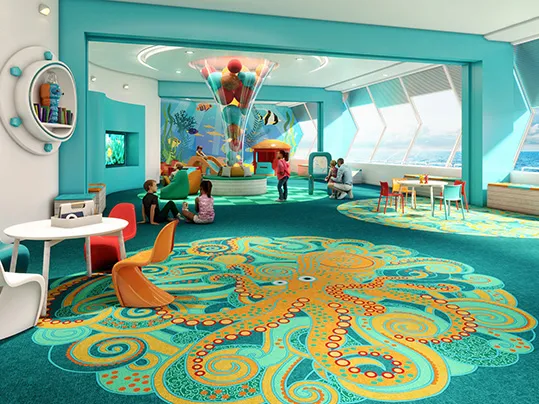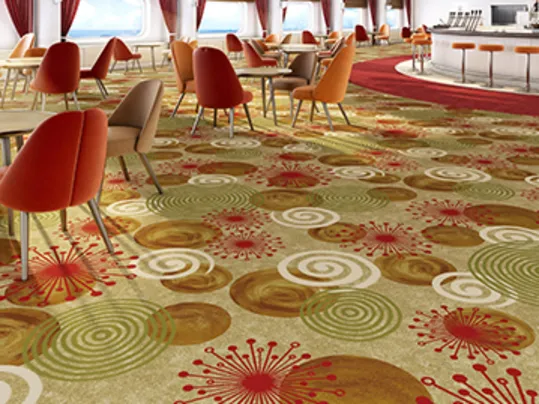The importance of acoustics
December, 2022

Reducing impact sound as well as ambient noise is a key consideration for cruise providers. In this effort, acoustic floor covering solutions are a simple and effective tool. Here, Béatrice Balle Coureau, Product Manager Flotex at Forbo Flooring Systems, discusses the issue of noise and details how it can be controlled with the correct floor covering specifications within cruise-liner environments.
The opportunity for rest and relaxation in luxurious surroundings is one of the biggest appeals of a cruise holiday. Yet, with noise from the engines and bow thrusters, coupled with vast numbers of people, activities and entertainment taking place, finding a bit of peace and quiet on a cruise ship can be a difficult task. In fact, a study discovered 31% of people find ship cabins to be acoustically uncomfortable [1].
To this end, reducing impact sound, as well as ambient noise is always an important consideration if the goal is to provide a restful and relaxing break away. Cruise operators look to achieve the IMO Resolution on cabin noise limits in order to achieve noise levels that fall below 60dB [2].
So, why is this so important? Well, for one, excess noise levels increase the likelihood of customer complaints. This phenomenon is well-documented within the hotel sector. A survey found that 82% of people are less likely to recommend a hotel if they had a bad noise-related experience. [3]
The same results should be expected within cruise-line environments, which share a lot in common with hotels. As such, the issue has the potential to seriously affect customer satisfaction rates and could ultimately lead to a downturn in bookings. In this moment of rebuilding, it’s essential the sector does all it can to avoid this happening.


Cruise ship staff are also vulnerable to negative effects caused by excess noise levels. Across workplaces, this issue has been routinely linked to increased levels of stress, as well as diminishing productivity and concentration levels. As such, there’s a significant financial and wellbeing incentive to improve performance in this area.
For example, a British Journal of Psychology study found that workers can be up to 66% less productive when exposed to excess background noise [4]. Similarly, research from the National Library of Medicine found that even intermittent exposure to loud noises can lead to higher long term stress hormone levels and hypertension rates [5].
Acoustic flooring solutions can control impact sound and reduce excess noise as effectively as similar wall or ceiling acoustic technologies. To this end, the cruise ship sector has the potential to gain significant results from the installation of acoustic floor coverings.
For example, our Flotex FR is a unique, textile, flocked floor covering, combining the cleaning properties and durability of a resilient flooring with the comfort and slip resistant usually associated with textiles. As well as being available in a wide variety of designs and colours plus having bespoke design possibilities, it also benefits from excellent acoustic properties, delivering up to 22 dB sound reduction.


With the further adoption of acoustic floor covering solutions, those working in cruise ship design can offer customers more comfortable and enjoyable surroundings. Furthermore, the benefits of these systems will be felt by staff and could lead to a decrease in noise-related illnesses. Whilst there remain limited studies on the effects of noise on cruise ship staff [6], the links between health effects from noise exposure are well known [7].
Controlling acoustic performance within cruise line environments has always been important and plays a key role in attracting repeat business. So, if you’re involved in the marine sector interiors and want to help gain optimum performance then talk to us at Forbo Flooring Systems.
1 – Goujard, B., Sakout, A. & Valeau, V. 2005. Acoustic comfort on board ships: An evaluation based on a questionnaire. Appl. Acoust. 66(9), 1063–1073.
2 – IMO (International Maritime Organization). 1981. Resolution A.468 (XII) of 19 November 1981 on Code on Noise Levels on Board Ships. Cited: Click to access blastDataHelper.asp Accessed 25. 1. 2016
3 – Leizer, L., 2016. Why hotels should take noise complaints seriously – Quiet hotelrooms. [online] Quiet hotelrooms. Available at: <https://www.quiethotelroom.org/why-hotels-should-take-noise-complaints-seriously/> [Accessed 2 September 2021].
4 – Banbury, Simon, and Dianne C. Berry. “Disruption Of Office-Related Tasks By Speech And Office Noise”. British Journal of Psychology 89.3 (1998): 499-517.
5 – Spreng M. Possible health effects of noise induced cortisol increase. Noise Health. 2000;2(7):59-64. PMID: 12689472.
6 – Borelli, D., Gaggero, T., Rizzuto, E. & Schenone, C. 2015. Analysis of noise on board a ship during navigation and manoeuvres. Ocean Eng. 105, 256–269.
7 – Alves-Pereira, M. & Castelo Branco, N.A.A. 2007. Vibroacoustic disease: Biological effects of infrasound and low-frequency noise explained by mechanotransduction cellular signaling. Prog. Biophys. and Mol. Biol. 93, 256–279.